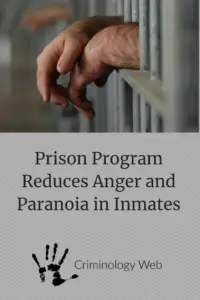
How can inmates be best prepared for their life after prison? This question has been hotly debated for long. A successful return of inmates to society is important because it can lower the risk that they will again commit crime. One way to make the transition from prison back to society more successful can be through a rehabilitation prison program. A new study in Portugal shows that such programs can lower inmates’ feelings of anger, shame, and paranoia.
Table of Contents
Rehabilitation in a Prison Program
In this study, the researchers examined the effects of the rehabilitation program “Growing Pro-social.” This program aims to improve several types of skills in offenders. These include how they handle emotions, how they think about themselves and other people, and how they act when experiencing strong emotions. The so-called cognitive behavioral program consists of 40 sessions of 90 minutes. It tries to change the view that offenders have of themselves and others.
For example, the participants are first asked to trigger a certain emotion, such as anger. Next, they are asked to feel that emotion in their body and to think about real-life situations in which they feel these emotions. Participants are then questioned about their reactions during such exercises and to apply their new knowledge in real life.
Anger, Shame, and Paranoia
The rehabilitation program tries to make offenders more confident and to view themselves as more worthy, so that they feel less ashamed and angry. Shame and anger are important factors in criminal behavior, because violence and crime can be a way to cope with these feelings. People can experience shame and anger when they feel that their social status and the respect that they receive from others are threatened. Anger can be especially pronounced when it is combined with feelings of shame.
Besides shame and anger, some offenders are relatively paranoid and distrusting towards others. The prison program attempts to reduce inmates’ sense of paranoia by making them view other people as less threatening.
Long-term Rehabilitation Strategies
The researchers examined whether the “Growing Pro-social” program reduced feelings of shame, anger, and paranoia. To this end, they conducted a study in nine prisons in Portugal, among about 250 male inmates. The researchers then compared half of the inmates who received the program with the other half who did not.
The results showed that offenders who participated in the program were better able to control their anger after the program. They also felt less ashamed and paranoid compared to offenders who did not participate.
These effects still existed twelve months after the program was completed. In other words, the offenders who participated in the program were still using the strategies that they learned a year later.
Prison and Anger
Interestingly, inmates who did not participate in the program, and who followed the normal prison program and routine, showed more anger and less ability to control their anger the longer they spent in prison. These findings beg the question of whether regular prison practices may actually lead to emotions that may increase inmates’ aggressive behavior over time.
In sum, these results show that this prison program for rehabilitation seems to be effective in reducing emotional experiences that are associated with crime, namely shame, anger, and paranoia.
Study reference
Brazão, N., Rijo, D., Salvador, M. D. C., & Pinto-Gouveia, J. (2018). The Efficacy of the Growing Pro-social Program in Reducing Anger, Shame, and Paranoia over Time in Male Prison Inmates: A Randomized Controlled Trial. Journal of Research in Crime and Delinquency, 55(5), 649-686. DOI: 10.1177/0022427818782733
LINK

